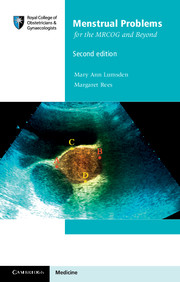Book contents
- Menstrual Problems for the MRCOG and Beyond
- Series page
- Menstrual Problems for the MRCOG and Beyond
- Copyright page
- Contents
- Abbreviations
- Preface
- Editors
- Contributors
- 1 Introduction
- 2 Excessive menstrual bleeding
- 3 Investigation
- 4 Medical management of excessive menstrual bleeding
- 5 Surgical management of menstrual problems
- 6 Uterine fibroids and heavy menstrual bleeding
- 7 Dysmenorrhoea
- 8 Endometriosis
- 9 Chronic pelvic pain
- 10 Delayed menarche
- 11 Premature ovarian failure
- 12 Polycystic ovary syndrome
- 13 Premenstrual syndrome
- Index
12 - Polycystic ovary syndrome
Published online by Cambridge University Press: 05 June 2014
- Menstrual Problems for the MRCOG and Beyond
- Series page
- Menstrual Problems for the MRCOG and Beyond
- Copyright page
- Contents
- Abbreviations
- Preface
- Editors
- Contributors
- 1 Introduction
- 2 Excessive menstrual bleeding
- 3 Investigation
- 4 Medical management of excessive menstrual bleeding
- 5 Surgical management of menstrual problems
- 6 Uterine fibroids and heavy menstrual bleeding
- 7 Dysmenorrhoea
- 8 Endometriosis
- 9 Chronic pelvic pain
- 10 Delayed menarche
- 11 Premature ovarian failure
- 12 Polycystic ovary syndrome
- 13 Premenstrual syndrome
- Index
Summary
Keywords
- Type
- Chapter
- Information
- Menstrual Problems for the MRCOG and Beyond , pp. 129 - 138Publisher: Cambridge University PressPrint publication year: 2014



